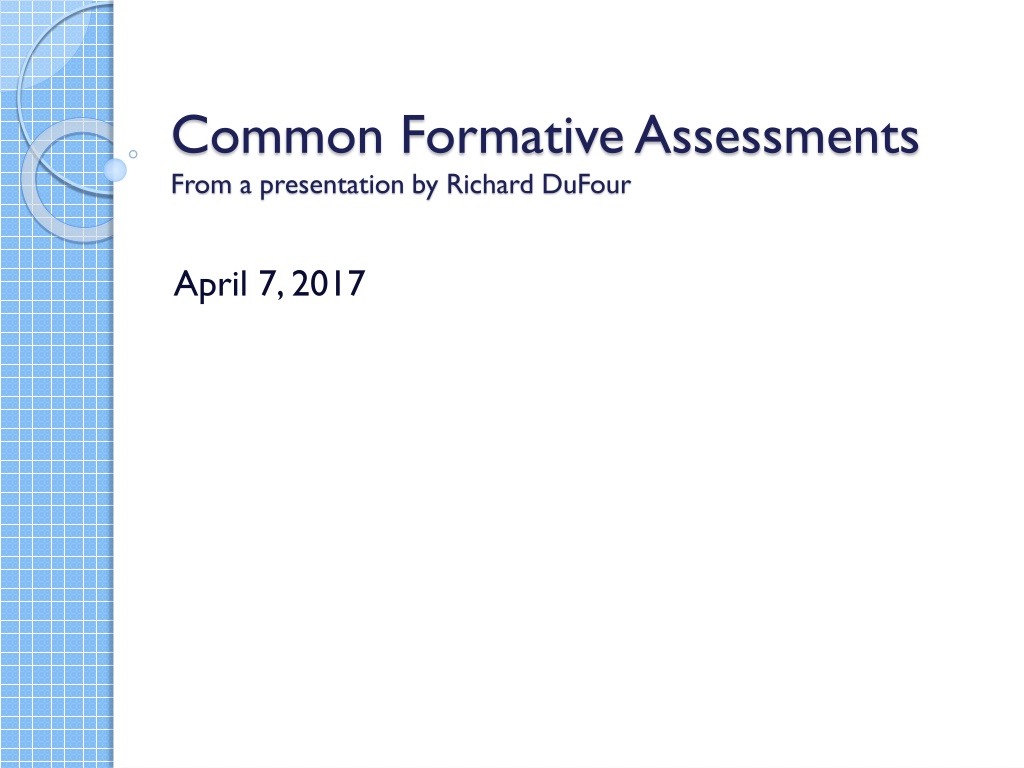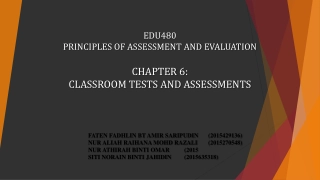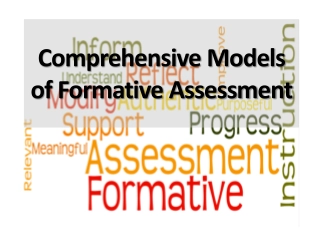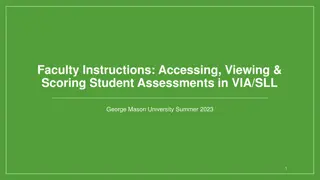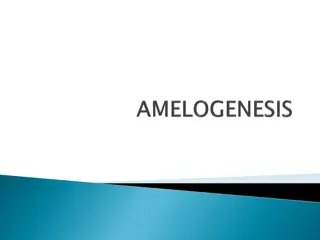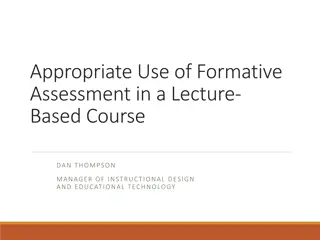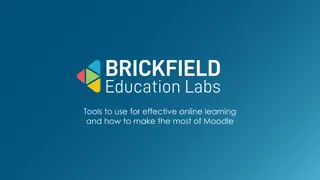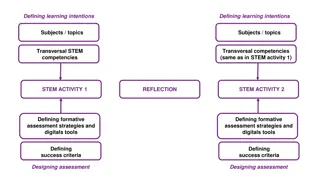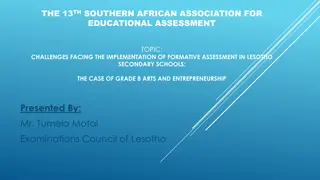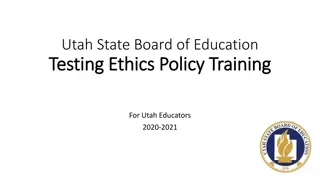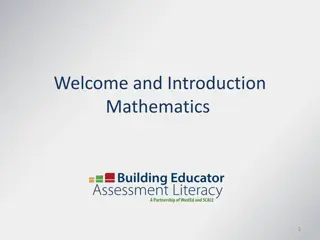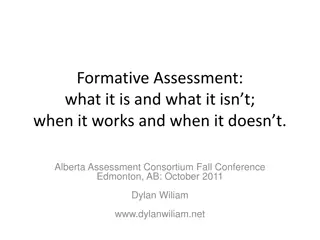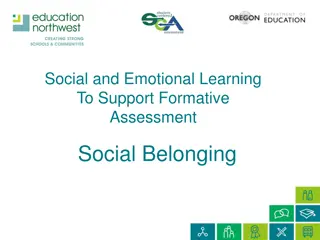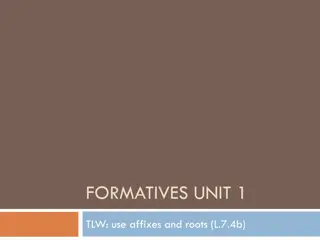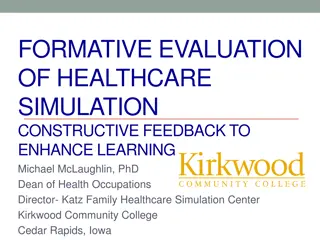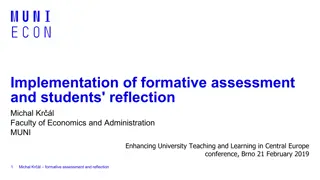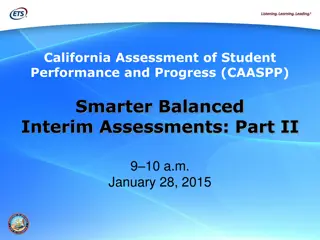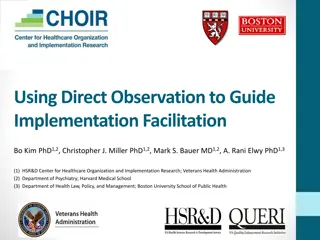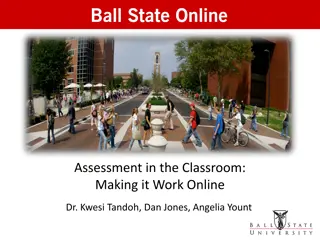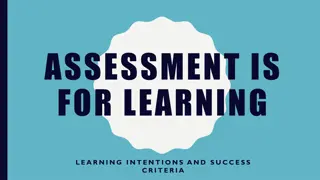Maximizing Student Growth Through Common Formative Assessments
Key concepts around common formative assessments (CFAs) are highlighted in this presentation, emphasizing the importance of shared understanding, aligning assessments with standards, and supporting student growth. The content delves into the purpose and benefits of CFAs, outlining criteria for effective assessments and discussing why CFAs are essential for improving student learning outcomes.
Download Presentation

Please find below an Image/Link to download the presentation.
The content on the website is provided AS IS for your information and personal use only. It may not be sold, licensed, or shared on other websites without obtaining consent from the author. Download presentation by click this link. If you encounter any issues during the download, it is possible that the publisher has removed the file from their server.
E N D
Presentation Transcript
Common Formative Assessments From a presentation by Richard DuFour April 7, 2017
Key Vocabulary In effective school systems, employees at all levels can explain what they are doing and why, with consistency. Everyone can talk the walk with shared understanding. -DuFour and Fullan, Cultures Built to Last: Systemic PLCs at Work, 2013
Common Formative Assessments CFAs are the lynchpin of the collaborative team process in a PLC. Formative Common
A Formative Assessment Is Assessment For Learning Brief Aligns directly with the standard to be learned Supports ongoing student growth Takes place during learning, not after Results are available in time to take action Provides feedback to students so they can monitor their own progress
A Common Assessment Is Used to assess the learning of all students pursuing the same curriculum Use of the same instrument and/or the same criteria. Administered at the same time or within a narrow window of time Administered to special education students according to the adaptions and modifications specified in their IEPs.
Keys to Common Formative Assessments To determine if an assessment process is formative, ask: Is it used to identify students who experience difficulty in their learning? Do students receive additional time and support for learning when they experience difficulty? Do students get an additional opportunity to demonstrate their learning? Do teachers use the results to inform and improve their individual and collective practice?
Why CFAs? Studies have demonstrated assessment for learning rivals one-on-one tutoring in its effectiveness and that the use of assessment particularly benefits low- achieving students. -Stiggins, 2004, p. 27
Why CFAs? Efficiency: By sharing the load, teachers save time. Fairness: They promote common goals, similar pacing, and consistent standards to assess student proficiency. Effective monitoring: Monitoring provides timely evidence of whether the guaranteed and viable curriculum is being taught and learned. Team capacity: Collaborative teacher teams can identify and address problem areas in their programs. Collective response: They support timely, systematic interventions (and extensions) for students. Informed teacher practice: Individual teachers obtain the basis of comparison that enables them to identify strengths and weaknesses of their teaching
Accurate Assessment is Not Enough Common formative assessments are the most powerful tool for helping a school begin to function as a professional learning community but only if they are used to: Inform and improve individual practice Improve the effectiveness of the team Identify students who need additional time and support for learning Identify students who are ready for enrichment
A Critical Error Too often we view the results of formative assessment to clarify what the student needs to do differently. Truly effective formative assessment must inform us about what we need to do differently. From I taught it to My students learned it.
What Could a CFA look like? An exit ticket A quiz remember, feedback Agree-disagree True-False Short written response
We Gave the Assessment, Now What? Our analysis is based on these essential learnings: These students need additional time and support to achieve proficiency: The support will look like: Our team s students struggled in this area: We believe the cause is:
